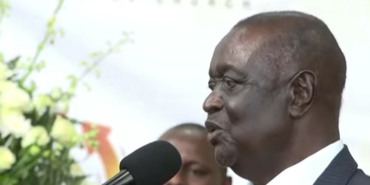Ruto’s Transfer of Kenya’s Public Seal Sparks Legal and Political Controversy

A contentious decision by President William Ruto's administration to transfer the custody of Kenya's Public Seal from the Attorney-General's Office to the Chief of Staff and Head of Public Service, Felix Koskei, has ignited a legal and political firestorm, raising profound questions about executive authority and the sanctity of institutional checks and balances.
The move, formalised through Executive Order No. 1 of 2023, was implemented shortly after Ruto assumed office in September 2022. It has since become a focal point of intense scrutiny, with legal experts and parliamentary committees voicing strong opposition to what they perceive as an overreach of executive power. At the heart of the controversy is the Public Seal's pivotal role in authenticating official state documents, agreements, and governmental actions. Traditionally, this responsibility has resided with the Attorney-General, as enshrined in Kenya's Constitution.
Critics argue that shifting the seal's custodianship to the Head of Public Service, a close presidential aide, undermines legal safeguards and introduces the potential for political influence in matters that demand impartiality. Constitutional lawyer Evans Ogada articulates the concerns, stating, "The move undermines the Attorney-General’s constitutional independence and creates unnecessary legal ambiguities." He further warns that such a transfer could jeopardise the integrity of governmental institutions.
Parliamentary and Legal Resistance
Despite the Executive Order facilitating the transfer, the government sought to codify the change through the Administration Laws (Amendment) Bill, 2023. However, the National Assembly’s Justice and Legal Affairs Committee rejected the measure, citing concerns that it contravened constitutional provisions.
The debate reached a crescendo when government spokesperson Isaac Mwaura struggled to provide clarity on the seal's official custodian, offering conflicting statements that only added to the confusion and fueled further scepticism.
Constitutional and Statutory Framework
Legal experts have pointed to Article 156(4)(a) of the Constitution, which unequivocally designates the Attorney-General as the government's principal legal adviser. Additionally, the Office of the Attorney-General Act explicitly mandates the AG's responsibility for the custody of the Public Seal. Section 28 of the Office of the Attorney-General Act further specifies that "The Attorney-General shall have custody of the Public Seal of the Republic of Kenya," with subsections detailing the AG's authority over its use. These provisions are designed to ensure legal oversight in state transactions, preventing unauthorised commitments that could potentially burden Kenyan citizens.
Inconsistencies and Contradictory Statements
While Parliament rejected the proposed amendment in 2024, government representatives have affirmed that the transition had already taken place. However, the contradictory statements from spokesperson Mwaura, who initially asserted that the transfer complied with the law before backtracking and acknowledging that the seal remained with the Attorney-General, have deepened the ambiguity surrounding the issue.
Implications for Governance and Transparency
The ambiguity surrounding the seal's custodianship has raised concerns about executive power consolidation. Observers have noted that crucial government decisions, including high-profile impeachments, have been executed through swift gazette notices, fueling suspicions about the motivations behind the transfer.
Examples of rapid governmental actions include the formalisation of former Deputy President Rigathi Gachagua’s impeachment, announced via gazette notice just hours after the Senate upheld the ouster on October 17, 2024.
Similarly, nominated Senator Gloria Orwoba’s expulsion from Parliament was confirmed through a gazette notice published on May 21, 2025, shortly after the Registrar of Political Parties communicated the disciplinary committee’s ruling.
These instances underscore how control over the Public Seal can influence the speed and execution of critical governmental processes.
Former National Assembly Speaker and current Cabinet Secretary Justin Muturi characterises the transfer as an attempt to bypass accountability mechanisms, stating, "I think it is mischievous and an effort to bypass accountability mechanisms. It suggests nostalgia for an imperial presidency.”
Broader Political and Economic Risks
The Public Seal's implications extend beyond government documentation, with significant consequences for Kenya’s governance. Legal scholars warn that its mismanagement could expose the country to economic and diplomatic risks.
Kirinyaga Woman Representative Njeri Maina, a lawyer aligned with Gachagua, emphasises the seal's sensitivity, cautioning that, in the wrong hands, it could be used to approve questionable trade agreements or take loans on behalf of the nation.
The attempt to shift control to the Head of Public Service suggests an effort to centralise decision-making within the Executive. Critics argue that placing the seal under a presidential aide strips the Attorney-General’s office of its constitutional role and exposes the system to potential manipulation.
Parliamentary Response and Calls for Institutional Protection
The National Assembly’s Justice and Legal Affairs Committee, in a February 2024 report, found no compelling justification for the transfer, reaffirming the AG’s role as the rightful custodian. National Assembly Speaker Moses Wetang’ula underscored the constitutional ramifications, warning that any change to government functions must preserve institutional independence.
Wetang’ula said, “In seeking to alter governmental roles, the Bill affects key constitutional bodies and disrupts checks and balances. Altering the mandates of entities such as the National Security Council, the Assumption of Office of the President Committee, and the Attorney-General’s Office risks overstepping constitutional boundaries.”
Constitutional lawyer Kibe Mungai reiterated that the AG is entrusted with defending public interest, cautioning against executive interference. He noted, “The Attorney-General is not appointed arbitrarily; the office must meet legal and moral qualifications.” Mungai argued that handing the seal to the Head of Public Service effectively transforms the role into a presidential extension, diminishing accountability.














Add new comment